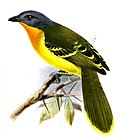Superregnum: Eukaryota
Cladus: Unikonta
Cladus: Opisthokonta
Cladus: Holozoa
Regnum: Animalia
Subregnum: Eumetazoa
Cladus: Bilateria
Cladus: Nephrozoa
Superphylum: Deuterostomia
Phylum: Chordata
Subphylum: Vertebrata
Infraphylum: Gnathostomata
Megaclassis: Osteichthyes
Cladus: Sarcopterygii
Cladus: Rhipidistia
Cladus: Tetrapodomorpha
Cladus: Eotetrapodiformes
Cladus: Elpistostegalia
Superclassis: Tetrapoda
Cladus: Reptiliomorpha
Cladus: Amniota
Classis: Reptilia
Cladus: Eureptilia
Cladus: Romeriida
Subclassis: Diapsida
Cladus: Sauria
Infraclassis: Archosauromorpha
Cladus: Crurotarsi
Divisio: Archosauria
Cladus: Avemetatarsalia
Cladus: Ornithodira
Subtaxon: Dinosauromorpha
Cladus: Dinosauriformes
Cladus: Dracohors
Cladus: Dinosauria
Cladus: Saurischia
Cladus: Eusaurischia
Subordo: Theropoda
Cladus: Neotheropoda
Cladus: Averostra
Cladus: Tetanurae
Cladus: Avetheropoda
Cladus: Coelurosauria
Cladus: Tyrannoraptora
Cladus: Maniraptoromorpha
Cladus: Maniraptoriformes
Cladus: Maniraptora
Cladus: Pennaraptora
Cladus: Paraves
Cladus: Eumaniraptora
Cladus: Avialae
Infraclassis: Aves
Cladus: Avebrevicauda
Cladus: Pygostylia
Cladus: Ornithothoraces
Cladus: Ornithuromorpha
Cladus: Carinatae
Parvclassis: Neornithes
Cohors: Neognathae
Cladus: Neoaves
Cladus: Telluraves
Cladus: Australaves
Ordo: Passeriformes
Subordo: Passeri
Infraordo: Corvida
Superfamilia: Corvoidea
Familia: Malaconotidae
Genus: Malaconotus
Species: M. alius - M. blanchoti - M. cruentus - M. gladiator - M. lagdeni - M. monteiri
Name
Malaconotus Swainson, 1824
Type species: T.[. . . ?] olivaceus "Vieillot" Swainson = La Pie-Grieche blanchot, LeVaill. = Malaconotus blanchoti Stephens
References
W. Swainson, 1824. An Inquiry into the natural Affinities of the Zianiadce, or Shrikes; preceded by some Observations on the present State of Ornithology in this Country. (The) Zoological Journal, 1: 297.
Malaconotus is a genus of passerine birds in the bush-shrike family Malaconotidae, which is endemic to sub-Saharan Africa. Their Greek generic name suggests fluffy back and rump feathers.[2]
Description
All are large-bodied with robust legs and feet, and formidable shrike-like bills.[2] As in other Malacotini, the upper mandible (maxilla) has a subterminal tooth, opposing a notch on the lower mandible. Both nasal and rictal bristles are present, and they are unique in their family in having syndactyl feet (3rd and 4th digits fused).[2] They have 10 primaries and 12 rectrices like others of their family. The sexes are similar in appearance, but have dissimilar calls.
Habits
They form monogamous pairs that live fairly sedentary in woodlands or tropical forest. They are very vocal, but their duetting is poorly developed compared to the related genus Telophorus. Their displays include bill-snapping, a habit shared with helmetshrikes (and some vangas of Madagascar), which however differ in their social foraging habits and cooperative breeding. Malaconotus bushshrikes breed solitarily, lay a small clutch (5 maximum) of elongate eggs, and their chicks are altricial.[2]
Systematics
They likely occupy a basal position in the family.[2] About 60% of the species formerly placed here are now usually separated in Telophorus or Chlorophoneus. The old taxonomy is also often found though.
Malaconotus sensu stricto contains the following species:
| Image | Scientific name | Common Name | Distribution |
|---|---|---|---|
 |
Malaconotus cruentus | Fiery-breasted bushshrike | equatorial Africa, from Sierra Leone to western Uganda |
 |
Malaconotus lagdeni | Lagden's bushshrike | Rwanda, Uganda and the Democratic Republic of Congo |
 |
Malaconotus gladiator | Green-breasted bushshrike | Cameroon and adjacent Nigeria |
 |
Malaconotus blanchoti | Grey-headed bushshrike | Sub-Saharan Africa, although relatively absent in Central and Southern Africa |
 |
Malaconotus monteiri | Monteiro's bushshrike | Angola and Cameroon |
| Malaconotus alius | Uluguru bushshrike | Uluguru Mountains in Tanzania |
References
"Malacontidae". aviansystematics.org. The Trust for Avian Systematics. Retrieved 2023-07-16.
Hockey, P. A. R.; Dean, W. R. J.; Ryan, P. G. (2005). Roberts Birds of Southern Africa (7th ed.). Cape Town: Trustees of the John Voelcker Bird Book Fund. pp. 47–48. ISBN 0-620-34053-3.
Retrieved from "http://en.wikipedia.org/"
All text is available under the terms of the GNU Free Documentation License

